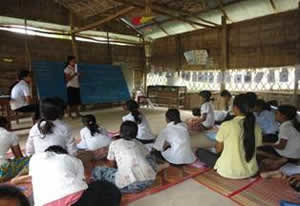 The Pre-Industry Life Skill (PILS) Program was designed to provide opportunities for vulnerable young women aged 15-24, who have expressed the intention to leave their home villages in search of economic opportunities, particularly in garment factories in urban areas. Supported by the International Labour Organization (ILO), the PILS program addressed the need for these women to have the skills necessary for job readiness and to be exposed to social and health messages delivered through a capacity building program, and the development of a peer system among young women leaders in the target communities.
The Pre-Industry Life Skill (PILS) Program was designed to provide opportunities for vulnerable young women aged 15-24, who have expressed the intention to leave their home villages in search of economic opportunities, particularly in garment factories in urban areas. Supported by the International Labour Organization (ILO), the PILS program addressed the need for these women to have the skills necessary for job readiness and to be exposed to social and health messages delivered through a capacity building program, and the development of a peer system among young women leaders in the target communities.
The PILS Program was implemented in Prey Veng Province, where there are chronic socio-economic problems, particularly food insecurity, owing to annual cycles of drought and flooding; thus, young girls and women migrate regularly to other areas of Cambodia in search of better livelihood opportunities. This migration is most often “blind” in that people migrate without a pre-arranged employment opportunity. Girls and young women among these migrants are most vulnerable — obliged to earn an income, but uneducated and inexperienced, they are the easiest prey for those involved in exploitative labor industries.
The goal of the PILS program was for vulnerable young women who are potential economic migrants to have the skills and knowledge to engage in migration that results in safer and improved work and life outcomes. This was achieved by providing participatory Training of Trainer (TOT) workshops and ongoing technical and monitoring support to selected community women leaders on pre-industry life skills topics and facilitation skills. These women leaders in-turn facilitated a 10-week course to young women in their communities who planned to migrate for work mainly for garment factory employment.
Through the development of a pre-industry life skills curriculum, PILS also seeked to provide a replicable model and materials for pre-industry life skills programs in other communities beyond this project. Through this program, World Education worked closely with Community Support Groups (CSG) made up of Commune Councils officials, mainly from the Commune Focal Points for Women and Children (CCWC) in the target communes. Their engagement encompassed attending trainings, data collection, target group identification and selection, and project monitoring support. The CSGs played a key liaison role between the beneficiaries and PILS project staff.
